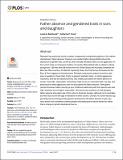Father absence and gendered traits in sons and daughters
Date
05/07/2017Metadata
Show full item recordAbstract
Research has previously found a number of apparently contradictory patterns in the relationship between ‘father absence’ (having a non-resident father during childhood) and the expression of gender roles, as well as other sexually dimorphic traits such as aggression. In the current study we measured a battery of sexually differentiated traits in relation to family background. 133 men and 558 women from the United States and Australia completed the Bem Sex Role Inventory, the Barrett Impulsivity Scale, the Fear Survey Schedule and the Buss & Perry Aggression Questionnaire. Principal components analysis found two main axes of variation in these traits. Firstly, a general ‘reactivity’ factor, on which aggression, impulsivity, and fear all loaded positively, was weakly associated with father absence in women. Secondly, ‘masculinity’ (consisting of high scores on masculine traits, low fear, and physical and verbal aggression) was not associated with father absence. Participants (except American males) reporting a poor childhood relationship with their parents also had high ‘reactivity’ but not higher ‘masculinity’. We found some evidence of a link between father absence and earlier age of first coitus in American females (although not in Australia), but there was no link with age of menarche in either country. Overall, the current results suggest that previous findings linking gender development with father absence in girls may have arisen from a tendency towards greater externalising and reactive behaviour rather than a change in gender development per se.
Citation
Boothroyd , L G & Cross , C P 2017 , ' Father absence and gendered traits in sons and daughters ' , PLoS One , vol. 12 , no. 7 , e0179954 . https://doi.org/10.1371/journal.pone.0179954
Publication
PLoS One
Status
Peer reviewed
ISSN
1932-6203Type
Journal article
Description
LGB was supported during data collection and initial drafting of the manuscript by the Economic and Social Research Council (PTA-026-27-0475).Collections
Items in the St Andrews Research Repository are protected by copyright, with all rights reserved, unless otherwise indicated.

